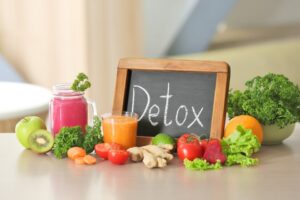
Introduction
It’s common to see diet programs promoted as a way of physical detoxification. Usually, these strategies entail following a restricted diet and taking various nutrients and herbs as supplements.
Diets that focus on detoxifying the body are more common than ever. These diets aim to rid your body of dangerous poisons and purify your blood. But it’s unclear exactly how they function, which particular compounds they’re meant to get rid of, and whether they even achieve this consult gastrologist hospital nearby. Keep reading for a detailed review of detox diets, including both the pros and cons.
What is a detox diet?
A detox diet is a short-term diet that removes toxins from the body, improves health, and helps in weight loss. However, there is little clinical evidence that detox diets actually work.
Detox diets can involve:
- Fasting
- Taking foods, like fruits, vegetables, and whole grain products
- Avoid foods like dairy, gluten, red meat, and fast food.
- Drinking juices or related beverages.
- Using herbs, refreshments, and supplements
- Cleaning the colon with enemas, laxatives, or colon hydrotherapy
Detox diets can be harmful if done wrong, and the body naturally detoxes on its own. Detox diets can help you cut back on bad components of your diet, such as sugar and alcohol. However, if you want to try a detox diet, keep it brief, probably for just two to three days.
The Science Behind Detox Diet
How does the body naturally detoxify itself?
- Our bodies have several systems in place to remove waste.
- The urinary system serves the most important role in detoxification.
- The most prominent activities in this system are waste and urination.
- The skin, liver, lungs, internal organs, and kidneys are the basic organs that make up the system for eliminating waste.
The role of the liver and kidneys
Kidneys naturally cleanse the body by cleaning waste from the blood. Staying hydrated, choosing specific foods, and following other habits may help to improve the function of the kidneys.
The liver destroys toxic compounds, converting them into harmless substances or removing them from the body. The liver’s byproducts end up in the liver or bloodstream. Liver toxins exit the body as waste, while blood toxins are filtered out by the kidneys and discharged in urine.
Do detox diets actually aid in detoxification?
Even if most detox diets are not needed, the foods a person decides to consume still have an impact on the body’s cleansing process. Truth About Detox Diets are:
- The body develops harmful substances from its surroundings.
- These include heavy metals such as mercury and persistent organic pollutants (POPs).
- POPs are pollutants that are found in food, soil, and water.
- They form in body fat, and research has connected them to chronic inflammation, cellular damage, and an increased risk of death.
Even if the body has the ability to detoxify itself, eating healthy meals and avoiding being around harmful chemicals in foods and the environment can help boost the organs involved in metabolism and, as a result, improve health.
The Impact of Detox Diets on Digestion
Short-term effects on digestion
Detox diets can cause fast changes in digestion. In a short time, people experience larger eliminations, cut bloating, and a feeling of losing weight. Some people may have diarrhea or stomach discomfort as a result of the sudden change in their food intake.
Long-term effects on digestion
As time passes, detox diets have different impacts on the digestive system. Some people experience faster digestion after completing a detox, while others may struggle in digesting or lack nutrients if they stick to a strict diet for a long period of time.
Potential risks of extreme detox diets
Highly detox diets are risky. They may dehydrate, decrease essential vitamins and minerals, and damage the digestive system. Following severe detox diets for long periods can lead to more serious medical issues, like digestive imbalances or damage to the intestine tissue.
Healthy Strategies for Improving the Digestive System
A balanced diet and staying hydrated:
- Eating different nutritious meals, including fruits, vegetables, whole grains, and low-protein foods, supports normal digestion.
- Drinking water keeps you hydrated and helps with digestion and constipation.
Regular Exercise
- Regular exercise helps proper digestion by engaging the muscles of the digestive system.
- Even simple activities, like walking, may help meals pass through your system more quickly.
Stress management:
- High stress levels may have a bad effect on digesting.
- Deep breathing, meditation, or simply relaxing can all help to reduce stress and improve the digestive system.
Conclusion:
Your body gets regularly interacting with toxins. However, it can usually remove them on its own. Here we have 1 from the top 10 healthcare experts. Dr. Nisharg Patel, a super specialist in liver illness treatment and gastrologist in Surat. While detox diets can look attractive, the benefits are most likely due to the removal of certain bad foods rather than the removal of harmful chemicals. Instead of starting on a possibly negative cleanse, a more effective strategy would be to eat healthier and improve your lifestyle.
